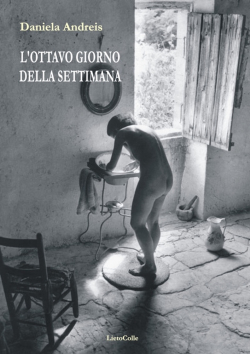Nuova Sezione Poemata-en
by Francesca Del Moro
When we think about a blind person, we imagine someone who has lost the sight and holds in the picture of the world experienced in the past. Like the leading figure of Emanuele Patrizi’s lines, now able to tell the piano white and black keys apart only by touching them, or like the character who, in Armio Neloci’s poem, undergoes a metamorphosis, becoming his own disease. But the blindness is also the “anti-look” of those who have never known reality through the eyes and therefore create it from scratch, as Fiorenza Mormile shows us, wisely combining logical thought and poetic vision. Moving to a metaphorical level, the fast-paced lyrics of Daniele Barbieri imitate a vortex that slowly drags us towards a dark bottom with an attractive and dangerous luminescence, while the short composition of Veruska Melappioni gathers the dichotomies beginning/end, night/day, dark/light in the breaking dawn.
Luminescent
by Daniele Barbieri
to descend, lap after lap, towards the lake, towards
the luminescent entity at the bottom, so vast
that something is exceeding, always, in the flare that
steadily shines through, always, towards the luminescent
entity that is the lake, so vast that the exceeding flare
shines through, that the light screams, that
we forget in this glory that the surface
does not live the life of what’s under it
with its blue note, stable and then more and more
stable in its black note, of the dark on the bottom,
of the dead on the bottom, that the light throws
in the solid vanishing lap after lap in the lake,
in the luminescent entity’s bottom, dark to dark,
cold and alien, death to death, in the breath held
that would ascend gurgling, rustling under the cold
skin, against its silence, against the silence of the black
water, against the full darkness of the cold blood at the bottom
The piano keys are all black now
by Emanuele Patrizi
The piano keys are all black now
I need to touch them to see them,
to distinguish sharp from flat notes;
the sound merges with colours
I can distinguish the four dimensions.
But what sin apple that apple is rotten
they left me in the dark stealing my flashlight.
This beginning will end
by Veruska Melappioni
This beginning will end.
Mantle’s tail,
New Year’s Eve dawn.
When I become my own disease
by Armio Neloci
When I become my own disease
I speak the braille of all my moles,
I bend then, my back warps
like a blister pack in the backbone,
infinitesimal:
I am a number in a row
of an infinite series
of a sequence following the comma.
Hypothesis on blindness
by Fiorenza Mormile
If I imagine the blind’s world
I always start from the sight
from those who had it and suddenly lost it
but continue to picture the world
behind closed eyes, like when we dream,
or like in the mind of those who listen
to fairy tales on the radio.
Maybe who is blind from birth is more creative,
does not reflect the world, re-establishes it,
has open guidelines, an “anti-look”
and modulates infinite declinations,
not dark, but differently-coloured.
(from Da Elsa a Isabella, Quaderno del Dars n. 12, Udine, 2017)
L'ottavo giorno della settimana
by Daniela Andreis
The eight day of the week is a time imagined outside the limits of time. It follows the changing of months and seasons, of hours, but it is the day when “racing to the opposite side of the competition” is possible, the day when you are free from every obligation, pressure, activity, and you can gather together in the memories and dreams. Two dimensions that merge in Daniela Andreis’ lines, populated by loved figures that slowly surface, delineated through small details: the gestures, the manners, the familiar objects and the events that marked their lives. Their stories are outlined by the gleaming of interior spaces in osmosis with nature, of sequences of moments drenched with thoughts and desires. The eyeglasses, the watch, the stoup, the wood, the mint flowers, the jasmine trail on the wall: everything is observed and recounted through a gaze that preserves the childhood attention span and is willing to surrender to surprise. These pages are filled with the atmosphere of an old countryside house, where everything is valuable and preserves the story of two people that we can identify as the author’s father and mother: a giant man and a woman of small physique who will turn him into “a flower in love with a tiny corolla”. Their love slides through the lyrics, from the early outbursts to the farewell, and it intertwines with the daughters’ relationships, with the author’s passions during adulthood. Because dreams and memories cannot be divided by airlock doors, and the love “that takes up so much room it’s suffocating” freely flows between them, reaching out to an everchanging “you”, through a language that refuses any rational logic to satisfy the senses, live of music and metaphors. The eight day is the day in which you can love “in reverse”, you can “make the cosmos turn back, reverse the fulcrum of the Sun”. A day when you turn into hourglasses, the sand leaking slowly, flipping over at their own authentic rhythm. It’s the exceeding day in which you celebrate the secret lovers’ weddings, the day invented like love was. “It’s not easy to talk to the living”, says one of the short compositions that, reduced to a single gnomic line, often suggest an interpreting key. For this reason, the author turns the “grindstone of words” into a new refuge, where she can actually talk to the loved ones, shaping a language able to express, in the eight day of the week, “the unutterable love” of Mandel’stam, able to address to her father, mother, sister, lovers, her “plea for the unpronounceable love”.
Daniela Andreis
L'ottavo giorno della settimana
Lieticolle, 2017

